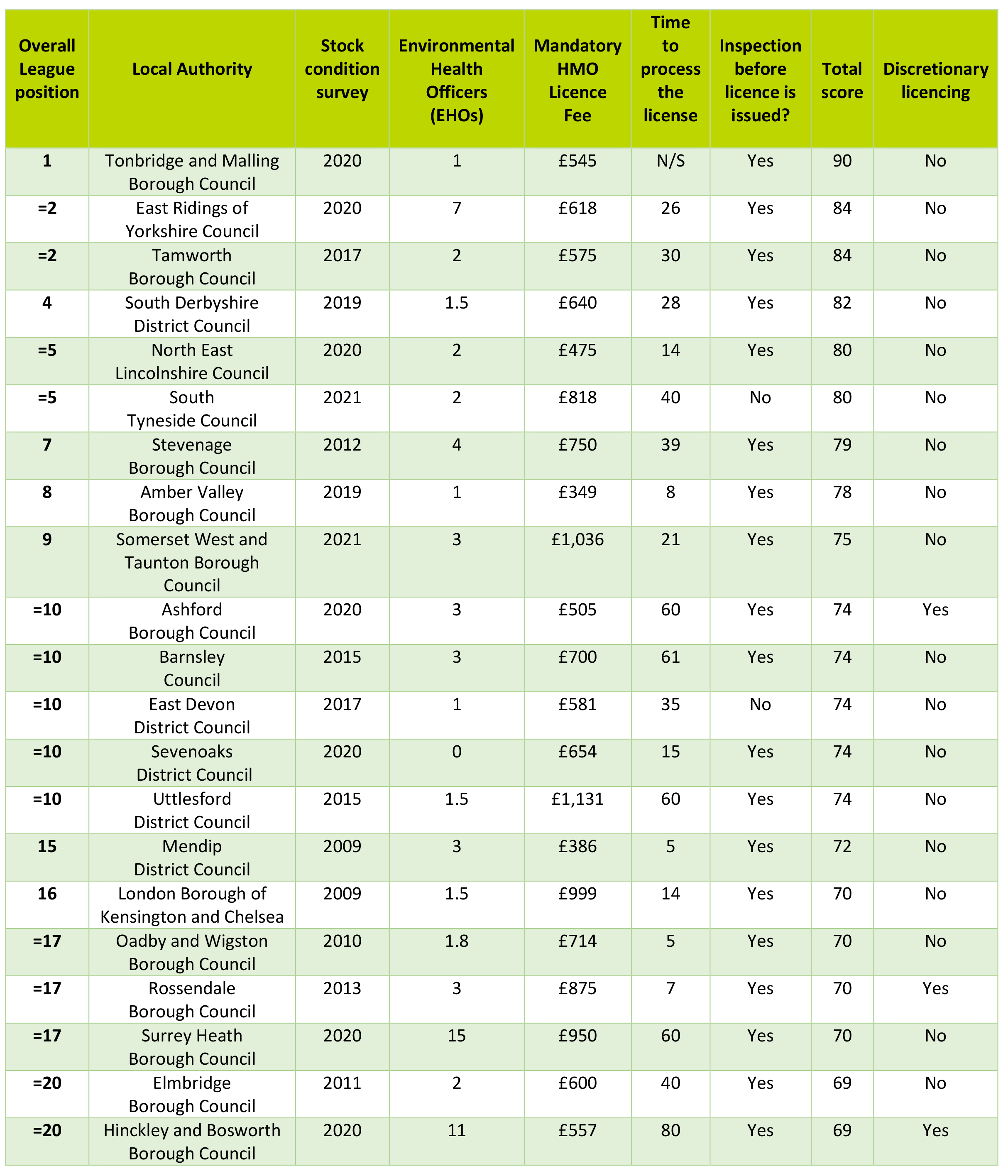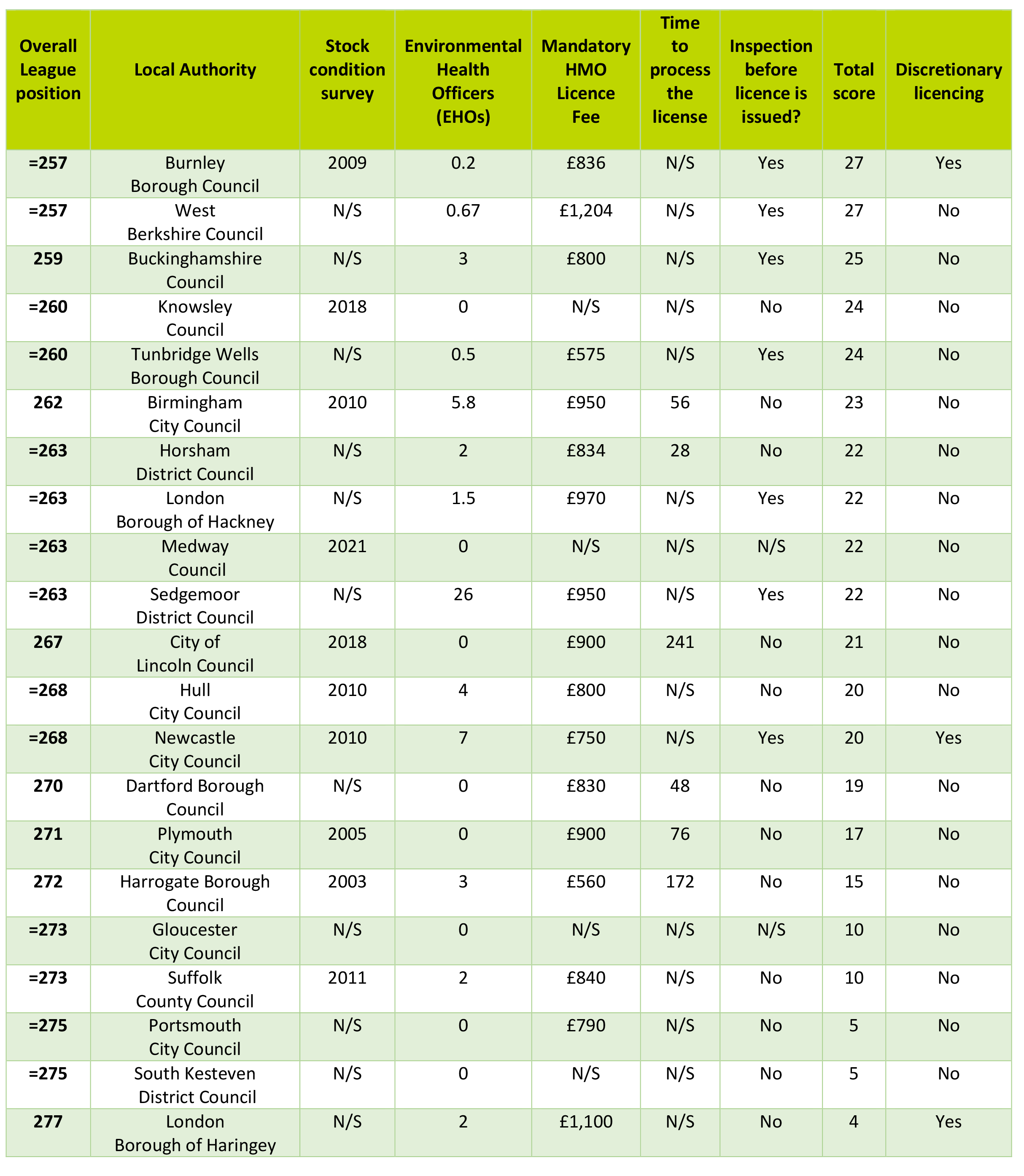

Local authorities and enforcement: an inconsistent, uneven patchwork
Introduction
The private rented sector forms a significant part of the housing market, with 11 million people currently living in the sector. Over the last decade, the sector has undergone considerable changes with local authorities being the body in place to regulate and ensure landlords comply with legal obligations.
With that in mind, the NRLA sent out a series of freedom of information (FOIs) requests over the last few years asking a range of questions. Our latest series of FOIs - presented here - asks a range of questions which covered local authorities' approach to licensing, information gathering and inspections.
Each local authority was then ranked according to their answers. The full report is below, along with a complete authority-by-authority ranking.
English Enforcement Index - Final Report
English Enforcement Index - local authority ranking
About the research
While it is often claimed the PRS is under-regulated, the private rented sector is actually quite heavily regulated. There are around 170 separate pieces of legislation, covering hundreds of different responsibilities that landlords must follow when letting a house or a flat.
Typically these rules are enforced by the local authority. However, previous research by the NRLA has found evidence of a postcode lottery for enforcement. Local authorities have wide ranging powers to set their own enforcement strategies and priorities based on the local needs. However, previous research found that some local authorities make frequent use of their powers, but many others do not use their existing enforcement powers to address the small minority of criminal landlords. This suggests that problems in the PRS are not because of under-regulation so much as under-enforcement by some local authorities.
Why some local authorities make better use of their enforcement powers is a difficult question to answer. Largely because there is currently no requirement to share the results of enforcement strategies. As a result, it is difficult to identify using publically available data, which local authority enforcement strategies are effective.
The twenty BEST performing local authorities

The twenty LOWEST performing local authorities

Regional Tables
The following link to regional league tables and provide a rank for each local authority who participated in the study. Please select the region or local authority in which you are interested:
Key Recommendations
- The Department for Levelling Up, Housing and Communities (DLUHC) must take steps to standardise enforcement across local authorities to improve consistency in application of legislation.
- The Department should review the use of civil penalties and examine why they are not being used effectively. Guidance should be issued to local authorities or legislative changes implemented to address this.
- DLUHC should also identify high-performing local authorities and facilitate sharing of best practices between authorities to improve outcomes across England.
- The Government should help to tackle the shortage of Environmental Health and Technical Officers (known as EHOs) by providing a training fund, as well as targeted training on underutilised enforcement tools such as civil penalties and improvement notices.
- The Government should establish a brand new role in England for a Chief Environmental Health Officer, to work alongside other agencies to spearhead a recruitment drive and provide guidance to existing EHOs nationally.
- The Chief Environmental Health Officer should work with local authorities and central government to develop policies to assist in such a recruitment drive.
- DLUHC should introduce mandatory requirements for processing times of licenses and regular housing stock assessments.
- Furthermore, mandatory record-keeping and reporting policies should be enacted between local authorities and DLUHC on statutory duties to ensure accountability and baseline data. This will enable critical policy decisions to be made based on reliable data and evidence.
Methodology
The data presented in the index tables is principally based on a series of freedom of information requests sent to 308 local authorities.
This freedom of information request asked local authorities to provide information on the following:
- How many housing units in the local authority did they estimate in the private rented sector (PRS)
- The year the local authority last carried out a Stock Condition Survey
- How many environmental health officers work for the local authority whose main job is to enforce standards in the private rented sector (Full Time)
- How much it costs a landlord to obtain a mandatory HMO licence for a single property occupied by five people in the local authority (excluding discounts)
- How many working days it takes for a typical mandatory HMO licence application to be processed and issued to a landlord
- Was it a local authority’s policy to inspect a property before issuing a mandatory HMO licence.
These questions were designed to assess the local authorities’ capacity to enforce and inspect, the accuracy of their information on the PRS, and the efficiency of their mandatory licensing scheme.
The information provided was then used to rank the overall performance of each respondent local authority and allocate them a place in the enforcement index.
Scoring metrics
A scoring metric was created to grade responses from local authorities:
| PRS Housing Units | Matrix Score |
|---|---|
| 0-2500= | 20 points |
| 2500-5000= | 14 points |
| 5000-10,000= | 10 points |
| 10,000-15,000= | 5 points |
| 15,000-30,000= | 2 points |
| 30,000+ | 0 points |
| Stock Condition Survey Years | Matrix Score |
|---|---|
| 2020+ | 20 points |
| 2017-2019= | 14 points |
| 2014-2016= | 10 points |
| 2010-2013= | 5 points |
| 2005-2009= | 2 points |
| Prior to 2005 | 0 points |
| Mandatory Licensing Cost | Matrix Score |
|---|---|
| <£100 & >£300 | 20 points |
| <£300 & >£500 | 14 points |
| <£500 & >£700 | 10 points |
| <£700 & >£900 | 5 points |
| <£900 & >£1500 | 2 points |
| £1500+ | 0 points |
| Mandatory Licensing Processing Time | Matrix Score |
|---|---|
| 22-44 working days | 20 points |
| 44-66 working days | 14 points |
| 66-132 working days | 10 points |
| 132-198 working days | 5 points |
| 198-264 working days | 2 points |
| 264 working days+ | 0 points |
| Mandatory Licensing Inspection Policy | Matrix Score |
|---|---|
| Yes | 20 points |
| No | 0 points |
English Enforcement Index - Final Report
English Enforcement Index - local authority ranking

